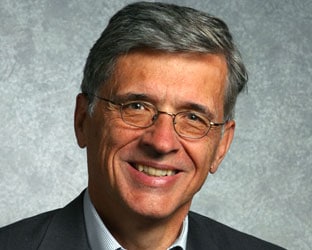 FCC Chairman Wheeler announced 2/19 that the Commission will reinstate rules to preserve a free and open Internet. The Open Internet Rules had been struck down by the D.C. Circuit earlier this year. Here is Wheeler’s statement and other government voices that have chimed in:
FCC Chairman Wheeler announced 2/19 that the Commission will reinstate rules to preserve a free and open Internet. The Open Internet Rules had been struck down by the D.C. Circuit earlier this year. Here is Wheeler’s statement and other government voices that have chimed in:
The FCommission won’t appeal a court decision that struck down rules it designed to ensure that the transmission of all Internet content be treated equally. Instead, it it will fashion new rules and will strive to “enhance Internet access competition.”
Said Wheeler: “In its Verizon v. FCC decision, the United States Court of Appeals for the District of Columbia Circuit invited the Commission to act to preserve a free and open Internet. I intend to accept that invitation by proposing rules that will meet the court’s test for preventing improper blocking of and discrimination among Internet traffic, ensuring genuine transparency in how Internet Service Providers manage traffic, and enhancing competition. Preserving the Internet as an open platform for innovation and expression while providing certainty and predictability in the marketplace is an important responsibility of this agency.
The D.C. Circuit ruled that the FCC has the legal authority to issue enforceable rules of the road to preserve Internet freedom and openness. It affirmed that Section 706 of the Telecommunications Act of 1996 gives the FCC authority to encourage broadband deployment by, among other things, removing barriers to infrastructure deployment, encouraging innovation, and promoting competition. The court recognized the importance of ensuring that so-called “edge providers,” those that use the network to deliver goods and services, can reach people who use the Internet. And it upheld the Commission’s judgment that Internet freedom encourages broadband investment and that its absence could ultimately inhibit broadband deployment.
Recently in Los Angeles, I talked to start-up entrepreneurs who produce video to meet consumers’ growing desire for programming. Their companies may succeed or they may fail depending on whether they are truly creative and innovative. But they and other innovators cannot be judged on their own merits if they are unfairly prevented from harnessing the full power of the Internet, which would harm the virtuous cycle of innovation that has benefitted consumers, edge providers, and broadband networks. This is why the FCC’s exercise of its authority to protect an open Internet is important.
Today we initiate several steps to ensure that the Internet remains a platform for innovation, economic growth, and free expression.
1. Propose new rules. I intend to ask my fellow commissioners to: –
• Enforce and enhance the transparency rule. The Court of Appeals has affirmed the Open Internet Order’s transparency rule, which requires that network operators disclose how they manage Internet traffic. This is more significant than many people may realize. We should consider ways to make that rule even more effective. For example, an explicit purpose of the rule is to afford edge providers the technical information they need to create and maintain their products and services as well as to assess the risks and benefits of embarking on new projects.
• Fulfill the “no blocking” goal. The D.C. Circuit recognized the importance of the Open Internet Order’s ban on blocking Internet traffic, but ruled that the Commission had not provided sufficient legal rationale for its existence. We will carefully consider how, consistent with the court opinion, we can ensure that edge providers are not unfairly blocked, explicitly or implicitly, from reaching consumers, as well as ensuring that consumers can continue to access any lawful content and services they choose.
• Fulfill the goals of the non-discrimination rule. We will carefully consider how Section 706 might be used to protect and promote an Open Internet consistent with the D.C. Circuit’s opinion and its earlier affirmance of our Data Roaming Order. Thus, we will consider (1) setting an enforceable legal standard that provides guidance and predictability to edge providers, consumers, and broadband providers alike; (2) evaluating on a case-by-case basis whether that standard is met; and (3) identifying key behaviors by broadband providers that the Commission would view with particular skepticism.
2. Keep Title II authority on the table. As the Court of Appeals noted, as long as Title II – with the ability to reclassify Internet access service as a telecommunications service – remains a part of the Communications Act, the Commission has the ability to utilize it if warranted. Accordingly, the Commission’s docket on Title II authority remains open.
3. Forgo judicial review of the Verizon decision. In light of the Court’s finding that the Commission has authority to issue new rules under Section 706 and the ongoing availability of Title II, the Commission will not initiate any further judicial action in connection with the Verizon decision.
4. Solicit public comment. A new docket is opened today called “Protecting and Promoting the Open Internet,” so that all public input on the court’s remand of the Open Internet decision will be collected and available. I will recommend to my fellow commissioners that the Commission seek comment through a formal rulemaking on the specific rules for preserving and protecting the open Internet. The focus of this docket will be on issues raised by the D.C. Circuit opinion.
5. Hold Internet Service Providers to their commitment. Major Internet service providers have indicated that they will continue to honor the safeguards articulated in the 2010 Open Internet Order. That’s the right and responsible thing to do, and we take them up on their commitment – which will continue to provide protection for the Open Internet until new rules are put in place.
6. Enhance competition. The Commission will look for opportunities to enhance Internet access competition. One obvious candidate for close examination was raised in Judge Silberman’s separate opinion, namely legal restrictions on the ability of cities and towns to offer broadband services to consumers in their communities.
When the earlier rules were adopted in 2010, some predicted that they would stifle investment and innovation. They were wrong. In fact, investment increased for both edge providers and in broadband networks. In particular, since 2009, nearly $250 billion in private capital has been invested in U.S. wired and wireless broadband networks. The FCC must stand strongly behind its responsibility to oversee the public interest standard and ensure that the Internet remains open and fair. The Internet is and must remain the greatest engine of free expression, innovation, economic growth, and opportunity the world has ever known. We must preserve and promote the Internet.
Said Rep. Henry Waxman (CA), Ranking Member, Committee on Energy and Commerce: “I welcome FCC Chairman Wheeler’s announcement today that the Commission will reinstate rules to preserve a free and open Internet. Chairman Wheeler is committed to achieving the same goal administratively that the bill I introduced earlier this month with Rep. Eshoo and Sen. Markey would achieve legislatively: stopping broadband providers from using their market power to block or interfere with the content consumers want to access. I expect the FCC to move expeditiously in readopting the rules and grounding them on a strong legal footing. I look forward to working with the FCC to ensure that consumers, innovators, and network operators benefit from the certainty of enforceable net neutrality rules of the road.”
Said FCC Commissioner Mike O’Rielly: “I am deeply concerned by the announcement that the FCC will begin considering new ways to regulate the Internet. As I have said before, my view is that section 706 does not provide any affirmative regulatory authority. We should all fear that this provision ultimately may be used not just to regulate broadband providers, but eventually edge providers. It appears that the FCC is tilting at windmills here. Instead of fostering investment and innovation through deregulation, the FCC will be devoting its resources to adopting new rules without any evidence that consumers are unable to access the content of their choice.”
Said Rep. Anna G. Eshoo (CA), Ranking Member of the Communications and Technology Subcommittee: “Using the FCC’s clear authority, as recognized by the D.C. Circuit Court, today Chairman Wheeler has proposed a series of actions that put consumers back in the driver’s seat when it comes to their online experience. The proposed FCC actions would enhance transparency for consumers so they know if and when their Internet service provider is slowing down or blocking online content, and include a commitment to restore the protections of the no-blocking and non-discrimination rules. Furthermore, the proposal aims to enhance broadband competition by reducing barriers to municipality-built broadband networks. I wholeheartedly welcome Chairman Wheeler’s proposed actions to preserve a free and open Internet, and I look forward to seeing these important steps implemented.”
Eshoo is a co-author of legislation with Waxman to restore Open Internet Rules until the FCC takes new, final action in the Open Internet proceeding. Senator Ed Markey sponsors the Senate companion bill.
Said House Energy and Commerce Committee Chairman Fred Upton (R-MI) and Communications and Technology Subcommittee Chairman Greg Walden (R-OR): “No matter how many times the court says ‘no,’ the Obama administration refuses to abandon its furious pursuit of these harmful policies to put government in charge of the web. These regulations are a solution in search of a problem, and with the many issues on its plate, including implementation of the spectrum incentive auctions, it would be wise for the commission to focus on fostering economic growth, job creation, and competition. We urge Chairman Wheeler, if he insists on moving forward, to pursue an open and transparent process, consistent with the recommendations of the commission’s Report on FCC Process Reform, as these regulations move forward.”
Said Congressman Marsha Blackburn (R-TN): “The last thing we need right now is more bureaucratic overregulation that will discourage innovation, hurt competition, and serve as an industry job-killer. Instead, we should be working with industry to encourage more innovation and job creation in the virtual space. This administration needs to stop mimicking some of the most restrictive policies of countries like China. Federal control of the Internet will restrict our online freedom and leave Americans facing the same horrors that they have experienced with HealthCare.gov. Since it is clear that FCC Chairman Wheeler is on a crusade to implement these socialistic regulations, I will soon be introducing legislation to block these efforts and protect Internet freedom for consumers.”
Said Senate Committee on Commerce, Science and Transportation Chairman John D. (Jay) Rockefeller IV: “I am happy that Chairman Wheeler has decided to move forward quickly to respond to the D.C. Circuit court’s net neutrality decision. The court made clear that Congress has spoken: the FCC has ample statutory authority to protect consumers and competition online. I have always supported the FCC’s use of its full authority under the Communications Act to accomplish these goals, and appreciate that Chairman Wheeler has kept all options on the table. I look forward to examining the Chairman’s plan in more detail.”
Said American Cable Association President and CEO Matthew M. Polka: “The independent cable community has worked constructively with the Federal Communications Commission for many years to craft rules and regulations that enable small and medium-sized operators to deploy broadband networks to serve their customers, and to ensure that their customers receive the best video, voice and Internet services possible. ACA strongly agrees with Chairman Wheeler that the entire Internet ecosystem requires certainty and predictability to promote investment, and looks forward to working with the FCC with regard to the Open Internet proceeding.”
RBR-TVBR observation: We applaud both Wheeler and Congress stepping in here. As we’ve said, the Court’s striking down Net Neutrality rules is, in our opinion, simply government collusion with big business—pure and simple. To think that they can censor what private individuals or anti-government groups post online, or charge people and companies to be seen on the internet, is simply against The First Amendment. With the FCC behind net neutrality as well as (hopefully) Congress, this Orwellian DC Circuit Court decision will be history.
O’Rielly’s statement is almost oxymoronic. Wheeler is trying to keep the internet unregulated, by not allowing big telecoms to decide what we can have access to. Don’t fix what isn’t broken. New neutrality does not equal “over-regulation.”





